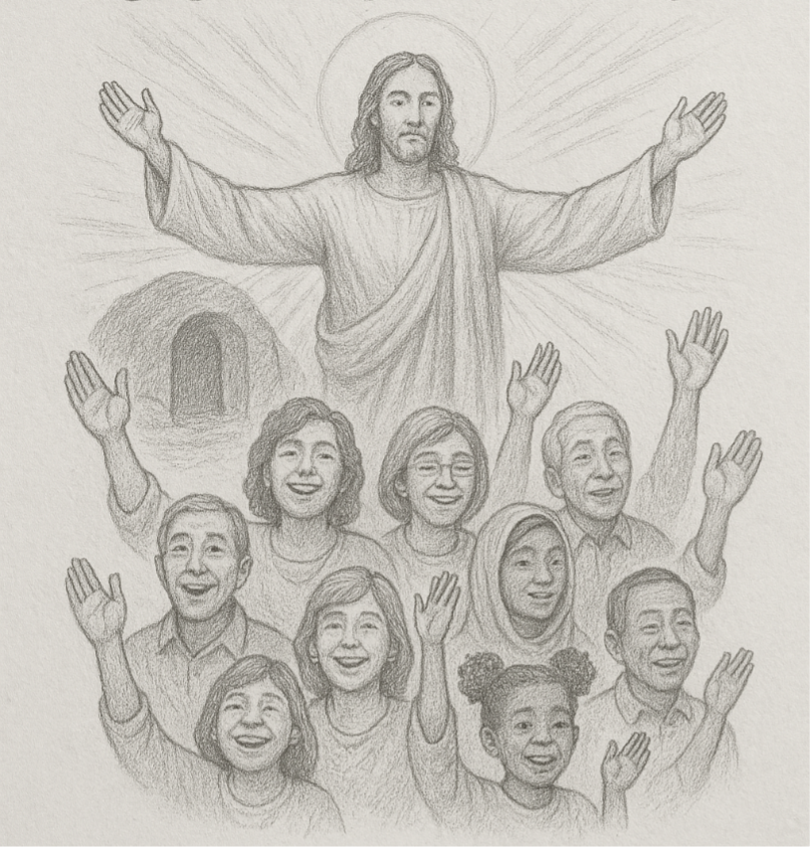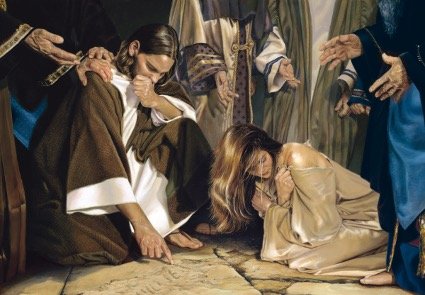
Gospel according to Saint John 6,60-69:
After hearing his doctrine, many of Jesus’ followers said, «This language is very hard! Who can accept it?». Jesus was aware that his disciples were murmuring about this and so he said to them, «Does this offend you? Then how will you react when you see the Son of Man ascending to where he was before? It is the spirit that gives life; the flesh cannot help. The words that I have spoken to you are spirit and they are life. But among you there are some who do not believe». From the beginning, Jesus knew who would betray him. So He added, «As I have told you, no one can come to me unless it is granted by the Father».
After this many disciples withdrew and no longer followed him. Jesus asked the Twelve, «Will you also go away?». Peter answered him, «Lord, to whom shall we go? You have the words of eternal life. We now believe and know that you are the Holy One of God».
Seeing Christ in everyone and everything
Luis CASASUS President of the Idente Missionaries
Rome, August 25, 2024 | XXI Sunday in Ordinary Time
Josh 24: 1-2.15-17.18; Eph 5: 21-32; Jn 6: 60-69
Right after finishing my studies at the University of La Laguna, I had the good fortune to start working at the Institute for Astrophysics of the Canary Islands. I was really enthusiastic and started to do research on the topic of my BS thesis. After two weeks, the Director, Professor Francisco Sánchez, a pioneer in Astrophysics in Spain, called me to his office. He asked me to present at an international conference a paper on interplanetary dust, mainly carried out by him and another veteran researcher. Neither of them could attend. I was terrified, since all I knew about the subject was what I had heard in two presentations.
However, he knew me well and told me: Don’t worry; at first one trembles a little, but in the end, if we are convinced of what we say, everything turns out well. I believed him; not because he had confidence in my abilities, but because I knew that he had been brave before and at the age of 25 he left his promising and secure position at the Complutense University of Madrid and went to Tenerife, seeking to confirm his suspicion that the Canarias sky was optimal for astronomical observation. Thus, little by little, following a path that no one had imagined, he created a research center that today brings together more than 400 scientists from around the world. I believed him because he asked me to do, on a smaller scale, something similar to what he had done.
That is the basis of trust at all levels, between human beings and with God himself.
People who transmit trust share several key traits. The most obvious is: they do what they say they will do or, in other words, they advise doing something they have done before. Trustworthy people, especially leaders, are transparent in their decision making and motivation, listen to the opinions of others, and put the interests of others before their own.
The first disciples were not in a position to understand Jesus’ words about the Eucharist, but the reaction of those who were honest was: I do not understand, but if you say so, I believe it. That belief does not mean “storing” a truth in the mind, but submitting to its consequences, to what that belief demands in my life.
That is why believing in the presence of Christ in the Eucharist is not simply “difficult”, but risky, because it supposes to act being aware that He is in front of me, putting His hope in me to live the same mercy that He lived when He instituted this Sacrament, precisely the night in which He was going to be betrayed. Could I think it was by chance?
Meister Eckhart (c. 1260- c. 1328) said: What good does it do me that Mary gave birth to the Son of God 1,400 years ago if I do not give birth to the Son of God in my person, in my culture and in my time?
Remembering what Christ did for us, the way he gave his life, revives our sense of family, of community. I remember that a missionary, whose father died a few weeks ago, met shortly after with all his brothers and they spent a good time remembering the phrases and gestures of his father in important moments, in difficult situations, and this revived their fraternal feeling.
In today’s First Reading, Joshua asks the people a question, after having remembered (in the previous chapters) how God protected them in the face of powerful enemies. And He always did, even though they did not respond with obedience and gratitude. Actually, it is not a historical book in the modern sense, but it relates slaughters, massive destructions and deaths of many kings that can be partially confirmed by Archaeology… anyway the important thing is not the victories and battles, but the clear help of Yahweh to a people that was neither the strongest nor the most numerous. The reaction is to declare their intention to be faithful to the God who protected them in such a continuous and spectacular way.
Although all that may seem far away and different from our experience, it is not so foreign. You and I are unfaithful every day… and we are continually forgiven. Our lack of delicacy and our attachment to judgments, conscious or not, are like the incessant clumsiness of the Chosen People. Instincts, the defense mechanisms of our ego, come into action at all times, like the gods who seduced and tempted the Jews with promises of immediate happiness.
Indeed, it is not only hard to believe in the presence of Christ in the Eucharist, but also in the importance of unity between spouses, as St. Paul reminds us today, or the need to be always sowing, working for the kingdom of heaven. In many moments of the day we are not aware of this imperative of Christ, of living the Gospel Spirit, which our Father and Founder reminds us so many times and which is more demanding than respecting the necessary moral laws and fighting against temptations: He who is not with me is against me; and he who does not gather with me scatters (Lk 11: 23).
It is the sense of urgency with which Joshua speaks to his people today: If you do not like to serve the Lord, say here and now whom you want to serve.
People we call saints have had this sensitivity, as for example the German Carmelite Saint Edith Stein (1891-1942), who wrote: He wants to draw me to himself, to his life and his love. The more deeply I am drawn to God, the more he calls me to go out of myself, to go out into the world to bring him divine life. The Eucharist is his greatest gift to me.
—ooOoo—
How can I be consistent, persevering in saying YES to Christ? How can I make of my life what St. Paul proposes today, an authentic and continuous service?
Some ascetic response may come to mind, some effort – even heroic – to be alert and always attentive to what our neighbor needs. But it is not enough. We need, as we would say in modern times, a very powerful “motivation” that does not change with our state of mind or with setbacks.
St. Teresa of Calcutta is known for collecting children from garbage dumps with all kinds of needs and illnesses. When asked where she got her motivation, Mother Teresa replied: I see Jesus in every human being. I say to myself: this is the hungry Jesus; I must feed him. This is Jesus who is sick. This one has leprosy or gangrene? I serve because I love Jesus. But, to see Christ in everything and everyone, we do not necessarily have to dedicate ourselves to these kinds of actions or be busy 24 hours a day. As happened to the disciples of Emmaus, we can discover Christ in everyone who walks beside us and, if we listen attentively, it will happen to us as it did to those depressed apostles: we will change course, we will really do what God expects of us.
Especially when we find ourselves in front of a “difficult” or insensitive person, or one who is really discouraged, we can clearly read the divine will. It will not occur to us to judge or think too much about the defects of that human being.
The Inspiration that the Holy Spirit gives us can be understood in the famous expression of St. Ignatius: To see God in all things. Whoever looks at the events, difficulties, joys, paradoxes of life with purity of intention, without wishing to be master of anything or anyone, will indeed see God, as the Beatitude promises to the pure of heart (Mt 5: 8). Seeing God means a permanent dialogue, in which everything becomes meaningful, especially the presence of one’s neighbor.
Martha and Mary could not understand why He had delayed so long, even though they had given Him timely notice of the illness of Lazarus whom He loved. Deep down, they complained to him: We cannot understand how you allowed the man whom you loved to die, why did you not come? Now it is too late, for he has been dead for four days. But Jesus had an answer that contains a very great truth: If you believe, you will see the glory of God!
Abraham could not understand why God asked him to sacrifice his son, but he trusted and saw the glory of God in the restoration of his love and in his choice to be a nation.
Jacob could not understand why his son Joseph was taken from his side, but he saw the glory of God when he looked into the face of his son and saw him as steward of the greatest power in the world of his time, savior of his own life and of the people around him.
Joseph, he could not understand the cruelty of his brothers, the false testimony of a disloyal woman and the years unjustly imprisoned, but he trusted and at last saw the glory of God in his restoration.
Moses, could not understand why God put him for forty years in the wilderness, but he trusted and saw when God called him to deliver and lead his people free
We may not understand why God allows certain things to happen, why we are visited by affliction, or why our paths are tortuous. We may not understand when our plans are frustrated and the purposes that seemed good do not work out. We do not understand why those blessings we need take so long, nor -especially- the pain of the people we love. In short… We do not have to understand all things, God does not expect us to understand them, but he does expect us to believe in his love and his goodness, to place our trust in him so that we can see him in all things and thus fulfill his will.
As Pope Francis said in an interview:
God is in the life of every person. God is in the life of every one. And even if a person’s life has been a disaster, even if vices, drugs or anything else has destroyed him or her, God is in his or her life. God can and should be sought in every human life. Even if a person’s life is a field full of thorns and weeds, there is always a space in which the good seed can grow. It is necessary to trust in God (19 AUG 2013).
_______________________________
In the Sacred Hearts of Jesus, Mary and Joseph,
Luis CASASUS
President













